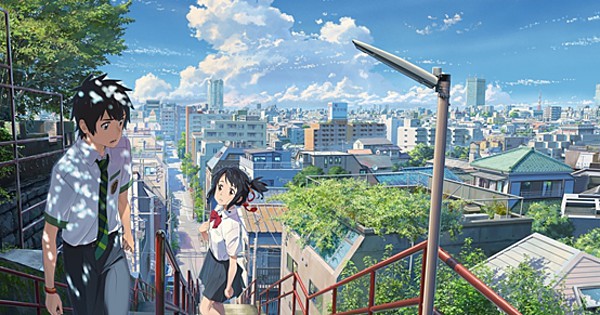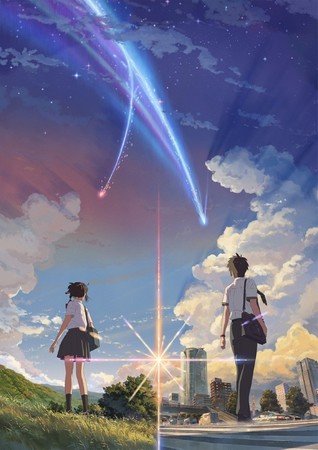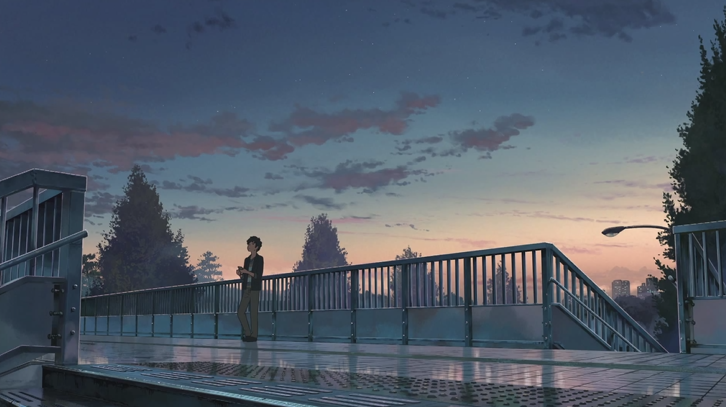Your Name… Here
September 24, 2016 · 1 comment
By Andrew Osmond.
 Makoto Shinkai’s film Your Name, to be released in British cinemas on 24th November [2016], is news in Japan already. As of writing, Your Name is poised to become the most successful non-Ghibli anime film ever released in cinemas. It’s fabulous news for the industry, and a leap up for Shinkai, whose past films were feted by fans but were commercially marginal at the box office. If Shinkai’s feat isn’t quite on the scale of Steven Spielberg in the 1970s, rising from Sugarland Express to Jaws, then Your Name still looks like a film Spielberg might have made himself, albeit in live-action with an American setting.
Makoto Shinkai’s film Your Name, to be released in British cinemas on 24th November [2016], is news in Japan already. As of writing, Your Name is poised to become the most successful non-Ghibli anime film ever released in cinemas. It’s fabulous news for the industry, and a leap up for Shinkai, whose past films were feted by fans but were commercially marginal at the box office. If Shinkai’s feat isn’t quite on the scale of Steven Spielberg in the 1970s, rising from Sugarland Express to Jaws, then Your Name still looks like a film Spielberg might have made himself, albeit in live-action with an American setting.
Great cinema anime relies on graphically potent images. Tokyo is engulfed in a ball of light (Akira), a girl surfs the wind on a glider (Nausicaa), a living doll dives down a building (Ghost in the Shell). Your Name starts with a thunderbolt; a fireball plunges down through the stratosphere towards Earth, webbing itself in cloud, like a Miyazaki image reinterpreted by a prophet of fire and brimstone. Shinkai’s favourite animated film, at least as of 2010, is Miyazaki’s Laputa, where a different object fell from the heavens.
 Like Laputa, Your Name takes viewers on a journey which becomes grandiose and wondrous at the end. But it starts as a cheery, populist comedy. In Shinkai’s film, two Japanese teenagers – a boy from Tokyo, and a girl from a remote country town – start to magically swap bodies. The boy wakes up “as” the girl, in the girl’s body and home, and vice versa. Each character must cope with a life and gender that’s completely new to them. We don’t recall any Ghibli film where the “heroine” investigates her breasts, or where the “hero” lowers a hand fearfully towards his crotch.
Like Laputa, Your Name takes viewers on a journey which becomes grandiose and wondrous at the end. But it starts as a cheery, populist comedy. In Shinkai’s film, two Japanese teenagers – a boy from Tokyo, and a girl from a remote country town – start to magically swap bodies. The boy wakes up “as” the girl, in the girl’s body and home, and vice versa. Each character must cope with a life and gender that’s completely new to them. We don’t recall any Ghibli film where the “heroine” investigates her breasts, or where the “hero” lowers a hand fearfully towards his crotch.
Western viewers may have seen body-swaps in one of the various versions of Vice Versa (a father swaps with his son) or Freaky Friday (a mum swaps with her daughter), or in umpteen oddball TV episodes. Perhaps the most infamous is “Turnabout Intruder,” the terrible final episode of the 1960s Star Trek, in which Captain Kirk swaps minds with a “hysterical” woman.
Your Name, though, uses the body-swap premise to play around in other genres, such as the fish out of water comedy. Shinkai’s film plays up the country girl’s awed reactions to suddenly being in Tokyo (Crowds! Cafes!) There are rom-com elements too, as the girl learns about the boy’s secret crush – a chic female senpai at the restaurant where he works – and moves their relationship along for the boy’s own good.
The film is rushed along itself by a montage of the characters’ shared lives, set to the runaway pop number “Zen Zen Zense” by the group RADWIMPS. In previous films (Garden of Words, 5 Centimeters per Second), Shinkai typically used pop numbers in the closing minutes, as cathartic recaps of his characters’ tortured emotions. In Your Name, it’s merely an upbeat way of telling the story, Hollywood-style.
Indeed, there are passages in Your Name which feel shockingly Hollywood, more than any other anime film in memory. But elsewhere in the film, Shinkai’s auteur presence is evident. In the pre-titles prologue, two voices, male and female, express their yearnings for something forgotten, their indefinable feelings set against images of Tokyo’s infrastructure, its buildings and trains. (Tokyo trains are as ubiquitous in Shinkai’s work as telegraph poles are in Hideaki Anno’s.)
 These opening minutes are so Makoto Shinkai… until Your Name’s opening titles kick in. These play exactly like the opening titles of a TV anime series, down to the intercutting and juxtaposing of the two main characters, and blink-and-miss clues to the story we’re going to see. We sometimes get TV-style titles in spinoffs from TV anime – for example, in the Magica Madoka films – but it’s a shock to see one in an “original” anime movie. Whereas Ghibli endeavours to dissociate itself with TV anime, and position itself as part of a global circle of animation, Your Name’s titles shout Anime and Proud.
These opening minutes are so Makoto Shinkai… until Your Name’s opening titles kick in. These play exactly like the opening titles of a TV anime series, down to the intercutting and juxtaposing of the two main characters, and blink-and-miss clues to the story we’re going to see. We sometimes get TV-style titles in spinoffs from TV anime – for example, in the Magica Madoka films – but it’s a shock to see one in an “original” anime movie. Whereas Ghibli endeavours to dissociate itself with TV anime, and position itself as part of a global circle of animation, Your Name’s titles shout Anime and Proud.
With these anime-isms, Shinkai-isms and Hollywood-isms united in one sleek product, Your Name is a metaphor for its crossover potential. Like its characters, the film goes out dressed to appeal to very different audiences; the couple who feels like a date movie on Friday night; the retiree who thinks the county scenery in the adverts looked a bit like Totoro; or the netizen who breaks Your Name into a flow-chart on an anime website, then rewatches the film three times to ensure nothing was missed. One of Your Name’s achievements is that it’s amenable to geeky analysis while being clear to everyone. Even if you get lost in the middle, the film’s last act makes it crystal clear what’s at stake, what must be done, and why we should care.
For Shinkai’s fans, there’s the extra fun of tracking his motifs – most obviously his obsession with the exquisite pain of unreachable desires, the conflation of physical distances with pin-sharp memories and misty longings. But you can equally enjoy Your Name as a pointed comedy of town and country. The film’s action swaps between the boy’s bustling Tokyo and the girl’s backwater village in the mountains. As well as modulating the drama, this lets different local audiences each see their Japan on screen. The film is lent a real-life dimension by the girl’s determination to leave for Tokyo once she’s old enough – the attitude that leaves many real Japanese country towns without futures.
It’s one angle that may end up highlighted by foreign critics, looking for what Your Name says “about” Japan. The story also contains an echo of recent Japanese history which is potentially controversial. We can’t say much without spoilers, but it’s the kind of thing that would get critical flak if the film wasn’t from Japan. Your Name is a post-trauma story that can only come from within the nation that’s traumatised, like the first Godzilla film in the 1950s.
There are greater hurdles to Your Name’s critical acceptance, not least the lack of a Ghibli logo. Your Name’s school-age characters may feel vulgar to some reviewers, while its Hollywoodisms may alienate anyone hoping for the next Princess Kaguya. (Kaguya, incidentally, was one of Ghibli’s lowest-earning films; Your Name has already made three times its money).
Then there’s Your Name’s running boob gag; the boy character fondles “his” breasts each time he’s in the girl’s body. While these are brief moments, some viewers may find them unpleasant and objectionable, a reminder of anime’s prurient reputation in the West. Then again, a completely wholesome film about male/female body-swaps might be accused of prissiness. You could take the breast-touching as a shorthand for all the obvious scenes which are not in Your Name. We glimpse the boy playing sports in the girl’s body, for instance, but we’re spared the locker room or a trip to the hot spring.
But other elisions may get critic complaints for missing opportunities. There’s no menstruation scene, for example; imagine how that would play out from the boy’s point of view! The story may be also judged too binary for 2016. Throughout Your Name’s body-swapping, it’s presented as the story of a boy in a girl’s body and a girl in a boy’s one. There’s no hint of transsexuality, no ambiguous identities, though the characters get better at performing their new genders over time. Whether Your Name needs a transsexual theme is a question to spark flame-wars, like asking if Ghibli’s Marnie is, or should be, a lesbian romance.
Most reviewers, though, should be wowed by Your Name’s luscious visuals, its celestially beautiful portrait of modern Japan in traditional animation. That gives the film a chance to be nominated in next year’s Oscars, though it’ll be a battle. Even if there are five animated feature nominees in 2017, three candidates already look like shoo-ins; Disney’s Zootropolis (aka Zootopia), Pixar’s Finding Dory and Laika’s Kubo and the Two Strings. Given the buzz collecting around Disney’s Christmas film Moana, it’ll be surprising if that isn’t nominated too. If so, Your Name will be fighting for the last place with the likes of Kung Fu Panda 3, the smutty Sausage Party, and the Ghibli-produced The Red Turtle…
Andrew Osmond is the author of 100 Animated Feature Films.
Andrew c
September 27, 2016 3:08 pm
Great post. It was really informative, and satisfied my need for discussion about anime to the Western world.